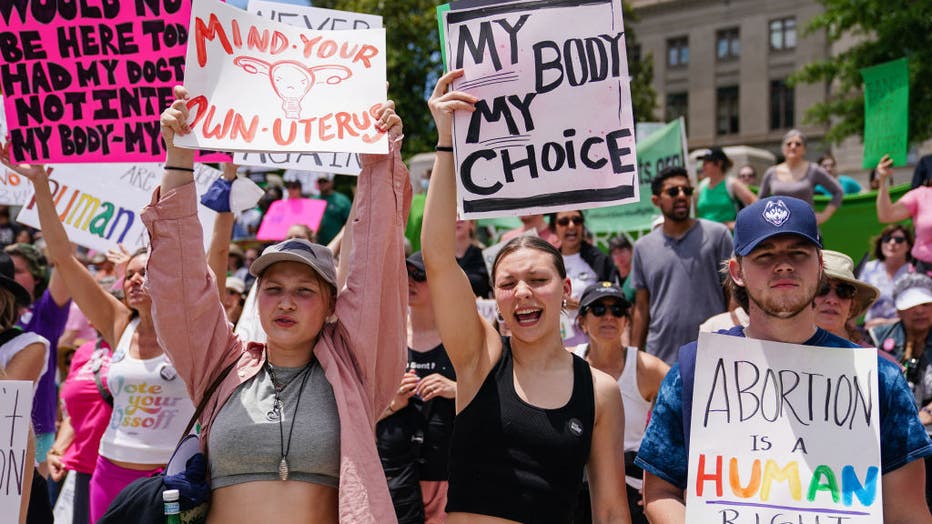ACLU, doctors file lawsuit seeking to block Georgia abortion law

Lawsuit filed by healthcare providers and advocates to challenge Heartbeat Bill in state court
Healthcare providers and advocates are looking to file a law suit to challenge Georgia's Heartbeat Bill and take it to state court saying that the lawsuit "is about restoring our patients right to make their own medical decisions."
FULTON COUNTY, Ga. - The ACLU and a group of Georgia physicians, reproductive health care providers, and advocates have filed a new lawsuit in Fulton County challenging the state's law banning abortion at around six weeks of pregnancy.
The law, which had been barred from taking effect, bans most abortions once a " detectable human heartbeat " is present. Cardiac activity can be detected by ultrasound in cells within an embryo that will eventually become the heart as early as six weeks into a pregnancy, before many pregnancies are detected.
With abortion illegal or heavily restricted in Deep South states except Louisiana, where its abortion ban is being disputed in court, Georgia patients more than six weeks pregnant are likely to be referred to clinics in Florida, North Carolina or even farther away.
QUICK GEORGIA ABORTION LAW CHANGE ABRUPTLY SENDS SOME PATIENTS HOME
The Georgia law includes exceptions for rape and incest, as long as a police report is filed. It also allows for later abortions when the mother’s life is at risk or a serious medical condition renders a fetus unviable and includes provisions that change the definition of "natural person," giving a fetus the same legal rights as people have once they’re born.

Advocates from both sides speak out about Georgia's anti-abortion law
Georgia restrictive new abortion law is now in effect after a federal court ruling. It comes weeks after the US Supreme Court's controversial decision to overturn Roe v. Wade.
In the challenge filed Tuesday, the attorney's argue that Georgia's "heatbeat" law signed by Gov. Brian Kemp in 2019 was "void from the start under Georgia judicial precedent" because it violated constitutional precedent when it was enacted. The attorney's also argue that Georgia's Constitution has "especially strong protection for the fundamental right to privacy," the basis of the U.S. Surpreme Court's previoius decision in Roe v. Wade.

Gov. Brian Kemp 'overjoyed' federal court OK's Georgia abortion ban
Gov. Brian Kemp said the court decision affirms his administration's promise to "protect life."
"This abortion ban sends the disturbing message that Georgia is closed to women seeking equal opportunity and basic rights to make private decisions about their future," ACLU of Georgia Executive Director Andrea Young, executive director said in a statement. "Georgia’s economic growth was built on the Atlanta business community’s commitment to diversity and tolerance and this extreme law will have a chilling effect on that growth."
The plaintiffs are asking the Superior Court of Fulton County to immediately block the law while the lawsuit goes through the court system.
The lawsuit also incudes a challenge to part of Georgia law which gives prosecutors access to abortion patients' medical records, arguing that it violates the privacy rights of Georgians.
"It is unfathomable that Georgians and people all over the country are losing the right to control their own bodies, their own futures, and their own medical decisions," said Dr. Evelyn Reynolds, Chair of the Planned Parenthood Southeast Board of Directors. "Georgia already has a severe physician shortage, not to mention some of the worst health outcomes in the nation — particularly for communities of color and people with low incomes. H.B. 481 is not only irresponsible, it’s flat out dangerous. Without relief, millions will be forced to flee the state, carry an unintended or dangerous pregnancy against their will, or seek support outside of the health care system. This law intrudes on the deeply personal and complex conversations that happen between a doctor and patient — we cannot and we will not let this stand."

Activists rally outside the State Capitol in support of abortion rights in Atlanta, Georgia. (Photo by Elijah Nouvelage / AFP) (Photo by ELIJAH NOUVELAGE/AFP via Getty Images)
Georgia is one of the biggest states to see sweeping restrictions on abortion. The National Abortion Federation listed 10 clinics providing surgical abortions before Wednesday, although an 11th clinic in Savannah had already closed after the Supreme Court acted.
One of those clinics, the Feminist Women’s Health Center in Brookhaven, had been performing 150 to 200 abortions per week, Executive Director Kwajalein Jackson said. That number rose when new limits went into place in other southeastern states in recent weeks, Jackson said.
State records show about 35,000 abortions were performed in Georgia in 2021.
The Asssociated Press contributed to this report.

